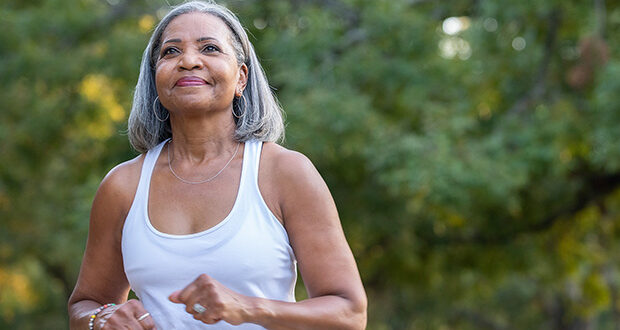Australia's first guidelines on physical exercise to reduce cognitive decline and improve mental health have been launched.
Regular physical exercise has been linked to reducing anxiety and depression and lowering the risk of dementia-onset by up to 30 per cent.
Yet, Melbourne University's director of the Psychiatry of Old Age unit, Professor Nicola Lautenschlager, said Australia lacked definitive guidelines on the types and frequency of exercise.
"After more than 20 years of global research, there's enough evidence to show that non-pharmacological approaches or lifestyle intervention can make a huge difference," she said.
"But implementing all that knowledge is our big challenge now."
Among physical activity, research has identified 12 risk factors that can increase the risk of dementia.
People who follow a lifestyle with a healthy diet, no smoking, low to no alcohol intake, and preventing or effectively treating depression and anxiety are less likely to have cognitive decline.
On the other hand, medical conditions such as high blood pressure, diabetes and head injury are associated with a higher risk.
Currently, over 15 per cent of Australia's older population is living with dementia, and the figure is projected to exceed 20 per cent in the next 30 years.
In February, federal data revealed that dementia had become the leading cause of disease burden, injury and premature death for people over 65.
While it's normal for people to become more forgetful as they become older, confusion and progressive memory loss are not age-related.
Lautenschlager said people often worry about their memory as they age because of the high prevalence of dementia.
Every week, Lautenschlager works in a memory clinic and diagnoses people on a regular basis.
It's probably the primary chronic disease of the 21st century, so it just indicates how many people are impacted by the disease, she said.
"There's a big fear and worry about it.
"We feel as if dementia is waiting for us the older we get.
"It's almost like a price we pay for longevity and better healthcare."
Nevertheless, Lautenschlager said regular exercise can significantly improve memory, protect cognitive function and help stave off dementia.
The study's exercise guidelines include four primary recommendations to reduce mild cognitive decline.
Older people should engage in moderate-intensity aerobic exercise for at least 150 minutes each week on top of regular physical activity, such as walking to the supermarket.
Aerobic exercise suitable for people over 65 includes anything from brisk walking, yoga, water aerobics and gardening.
"We consistently found that brain health and function, including a reduced risk of chronic disease like diabetes, was reduced in older adults through aerobic exercise," Lautenschlager said.
At least twice a week, they recommended that older people practise progressive resistance training using elastic bands or weights and engage in balance-improving activities.
While initially, the researchers planned to develop the guidelines, they saw an opportunity for a second study when the pandemic hit in 2020.
After federal and state governments enforced Covid restrictions, Australians between 65 and 74 experienced the most significant increase in anxiety and depression.
The pandemic also led to people 74 and over becoming most at risk of psychological distress due to [social] isolation.
The team responded by creating an individualised physical activity intervention called 'Exercise for Cognitive Health (EXCEL).'
"We started and conducted most of the study during the pandemic peak in Melbourne, where we had one of the strictest Covid measures in place," Lautenschlager said.
"We received amazing feedback – people felt more engaged, happier and fitter after regular exercise."
The over 50 participants each received a tailor-made package containing access to more than 700 exercise videos, a headband, weights and a Fitbit.
The exercise program differed for each person based on their medical history, age, previous injuries, what type of activities they liked and general interests.
Over 12 weeks, participants had regular check-ins with their coach and physiotherapist over Zoom.
Lautenschlager said one theme that emerged was that coaching helped turn a participant's intention into action by building confidence and strategies to overcome barriers.
"We set the bar very low at first because most hadn't exercised for a long time," Lautenschlager said.
"Over time, their confidence grew, and they became more dedicated and excited."
One participant said the coach 'helped her to get moving' and that 'any exercise was better than nothing.'
She said, 'I'll just go and walk around the block – at least I can say I've gone for a walk.'
"Of course, I would walk further than just around the block."
After the 12-week program ended, she realised how much her health and fitness had improved.
"I wouldn't get as puffed as before," she said.
"I actually had to push myself to get puffed, whereas before walking down the street … my heart rate would be increasing, whereas now, it doesn't."
Lautenschlager said that as Covid opened up the opportunity for a second study, the program also needed to be trialled outside of pandemic conditions.
"We had the best uptake and interest in this program when the pandemic was at its worst because people were stuck in their houses and didn't have anything to do," she said.
Once restrictions eased and people could leave their homes to see family and friends, adherence to the program significantly reduced.
Lautenschlager said that further studies should focus on motivating and engaging older people in combination with daily distractions.
Nevertheless, she said it highlighted the importance of personalised and tailored interventions.
"The study sets a foundation for improving protocols of holistic care for older Australians with mental health symptoms and cognitive concerns," Lautenschlager said.
"It also shows us that information and communication technology can help this age group overcome distance and isolation."
Do you have an idea for a story?Email [email protected]
 Aged Care Insite Australia's number one aged care news source
Aged Care Insite Australia's number one aged care news source

